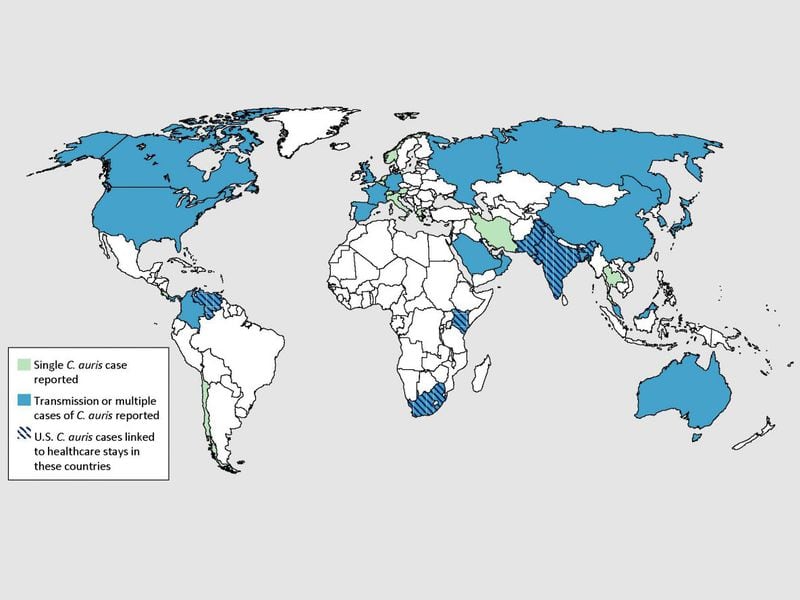A deadly superbug fungus continues to spread around the world and has now been reported in 14 states, including Georgia.
Candida auris is often resistant to multiple antifungal drugs commonly used to treat Candida infections and is difficult to recognize with standard laboratory methods, according to the Centers for Disease Control and Prevention in Atlanta.
The fungus, which is mostly found in hospitals and nursing homes and mostly infects those with weakened immune systems, was first identified in 2009 in the ear of a 70-year-old Japanese woman.
» Unprotected: Broken promises in Georgia's senior care industry
The CDC has confirmed 806 cases of C. auris in the United States, with most infections in New York and Illinois.
It reports an additional 30 probable cases, which were identified when laboratories with current cases of C. auris reviewed past microbiology records.
» Copper hospital beds kill bacteria, save lives, study finds
According to its most recent report, the breakdown of states is:
- California: five confirmed, zero probable
- Conncticut: one confirmed, zero probable
- Florida: 24 confirmed, zero probable
- Georgia: one confirmed, zero probable
- Illinois: 227 confirmed, four probable
- Indiana: two confirmed, zero probable
- Maryland: five confirmed, zero probable
- Massachusetts: eight confirmed, zero probable
- New Jersey: 137 confirmed, 22 probable
- New York: 388 confirmed, four probable
- Oklahoma: two confirmed, zero probable
- Texas: five confirmed, zero probable
- Virginia: one confirmed, zero probable
» These are Georgia's safest hospitals, according to new report
The CDC said it considers C. auris a serious global health threat for three main reasons:
- It is often multidrug-resistant.
- It can be misidentified in labs without specific technology. Misidentification may lead to inappropriate management.
- It has caused outbreaks in healthcare settings. For this reason, it is important to quickly identify C. auris in a hospitalized patient so that healthcare facilities can take special precautions to stop its spread.
The CDC’s map, above, shows the spread of the fungus worldwide. As of Sept. 30:
- Single cases of C. auris have been reported from Austria, Belgium, Chile, Costa Rica, Greece, Italy, Iran, the Netherlands, Norway, Switzerland, Taiwan, Thailand, and the United Arab Emirates.
- Multiple cases of C. auris have been reported from Australia, Bangladesh, Canada, China, Colombia, France, Germany, India, Israel, Japan, Kenya, Kuwait, Malaysia, Oman, Pakistan, Panama, Russia, Saudi Arabia, Singapore, South Africa, South Korea, Spain, the United Kingdom, the United States (primarily from the New York City area, New Jersey, and the Chicago area) and Venezuela; in some of these countries, extensive transmission of C. auris has been documented in more than one hospital.
- U.S. cases of C. auris have been found in patients who had recent stays in healthcare facilities in India, Kenya, Kuwait, Pakistan, South Africa, the United Arab Emirates, and Venezuela, which also have documented cases.
- Other countries not highlighted on this map may also have undetected or unreported C. auris cases.
About the Author







